
Rocket Lab (RKLB)
Rocket Lab doesn’t impress us. Its negative returns on capital show it destroyed value by losing money on unprofitable business ventures.― StockStory Analyst Team
1. News
2. Summary
Why Rocket Lab Is Not Exciting
Becoming the first private company in the Southern Hemisphere to reach space, Rocket Lab (NASDAQ:RKLB) offers rockets designed for launching small satellites.
- Suboptimal cost structure is highlighted by its history of operating margin losses
- Cash burn makes us question whether it can achieve sustainable long-term growth
- A consolation is that its annual revenue growth of 85.1% over the past five years was outstanding, reflecting market share gains this cycle


Rocket Lab doesn’t satisfy our quality benchmarks. We’re on the lookout for more interesting opportunities.
Why There Are Better Opportunities Than Rocket Lab
High Quality
Investable
Underperform
Why There Are Better Opportunities Than Rocket Lab
Rocket Lab’s stock price of $69.97 implies a valuation ratio of 45.5x forward price-to-sales. The market typically values companies like Rocket Lab based on their anticipated profits for the next 12 months, but it expects the business to lose money. We also think the upside isn’t great compared to the potential downside here - there are more exciting stocks to buy.
Paying a premium for high-quality companies with strong long-term earnings potential is preferable to owning challenged businesses with questionable prospects.
3. Rocket Lab (RKLB) Research Report: Q3 CY2025 Update
Aerospace and defense company Rocket Lab (NASDAQ:RKLB) announced better-than-expected revenue in Q3 CY2025, with sales up 48% year on year to $155.1 million. Guidance for next quarter’s revenue was better than expected at $175 million at the midpoint, 1.7% above analysts’ estimates. Its GAAP loss of $0.03 per share was 71.3% above analysts’ consensus estimates.
Rocket Lab (RKLB) Q3 CY2025 Highlights:
- Revenue: $155.1 million vs analyst estimates of $151.9 million (48% year-on-year growth, 2.1% beat)
- EPS (GAAP): -$0.03 vs analyst estimates of -$0.10 (71.3% beat)
- Adjusted EBITDA: -$26.28 million vs analyst estimates of -$23.63 million (-16.9% margin, 11.2% miss)
- Revenue Guidance for Q4 CY2025 is $175 million at the midpoint, above analyst estimates of $172.1 million
- EBITDA guidance for Q4 CY2025 is -$26 million at the midpoint, below analyst estimates of -$12.38 million
- Operating Margin: -38%, up from -49.5% in the same quarter last year
- Free Cash Flow was -$69.44 million compared to -$41.93 million in the same quarter last year
- Market Capitalization: $24.99 billion
Company Overview
Becoming the first private company in the Southern Hemisphere to reach space, Rocket Lab (NASDAQ:RKLB) offers rockets designed for launching small satellites.
Rocket Lab was founded in 2006 and established itself in the commercial space and rapidly improved its space technologies by making various acquisitions. Specifically, the acquisitions of Planetary Systems in 2019 and Sinclair Interplanetary in 2020 were pivotal for improving the company’s satellite technology, components, and systems. Rocket Lab would go on to become a public traded company in 2021 through a merger with Vector Acquisition.
Rocket Lab's primary product is the Electron rocket, designed specifically for launching small satellites which are crucial for scientific research, Earth imaging, communications, and navigation systems. Its rocket is designed to handle smaller payloads meaning that it can launch satellites for different customers at different times, either on its own or as part of a shared mission with other payloads. This is important because this allows its customers to get satellites into space without waiting for a large, expensive rocket launch.
The company offers dedicated launch services, where a single customer uses the entire rocket, and rideshare missions, where multiple customers share the launch vehicle. Costs are determined based on factors such as payload size, mission complexity, and specific customer requirements. Contract durations can vary, ranging from a few months for straightforward launches to several years for complex, multi-mission agreements.
Looking ahead, Rocket Lab is gearing up for its next big leap with the Neutron rocket, a larger and partially reusable launch vehicle. Neutron aims to further expand Rocket Lab's capabilities in delivering payloads to orbit and support larger satellite constellations.
4. Aerospace
Aerospace companies often possess technical expertise and have made significant capital investments to produce complex products. It is an industry where innovation is important, and lately, emissions and automation are in focus, so companies that boast advances in these areas can take market share. On the other hand, demand for aerospace products can ebb and flow with economic cycles and geopolitical tensions, which can be particularly painful for companies with high fixed costs.
Competitors offering similar products include Space X (private), Astra (NASDAQ:ASTR), and Virgin Orbit (NASDAQ:VORB).
5. Revenue Growth
A company’s long-term sales performance is one signal of its overall quality. Any business can have short-term success, but a top-tier one grows for years. Thankfully, Rocket Lab’s 85.1% annualized revenue growth over the last five years was incredible. Its growth beat the average industrials company and shows its offerings resonate with customers, a helpful starting point for our analysis.

Long-term growth is the most important, but within industrials, a half-decade historical view may miss new industry trends or demand cycles. Rocket Lab’s annualized revenue growth of 53.2% over the last two years is below its five-year trend, but we still think the results suggest healthy demand. 
This quarter, Rocket Lab reported magnificent year-on-year revenue growth of 48%, and its $155.1 million of revenue beat Wall Street’s estimates by 2.1%. Company management is currently guiding for a 32.2% year-on-year increase in sales next quarter.
Looking further ahead, sell-side analysts expect revenue to grow 47.8% over the next 12 months, a deceleration versus the last two years. Despite the slowdown, this projection is healthy and implies the market is baking in success for its products and services.
6. Operating Margin
Operating margin is a key measure of profitability. Think of it as net income - the bottom line - excluding the impact of taxes and interest on debt, which are less connected to business fundamentals.
Rocket Lab’s high expenses have contributed to an average operating margin of negative 57.6% over the last five years. Unprofitable industrials companies require extra attention because they could get caught swimming naked when the tide goes out.
On the plus side, Rocket Lab’s operating margin rose over the last five years, as its sales growth gave it operating leverage. Still, it will take much more for the company to reach long-term profitability.
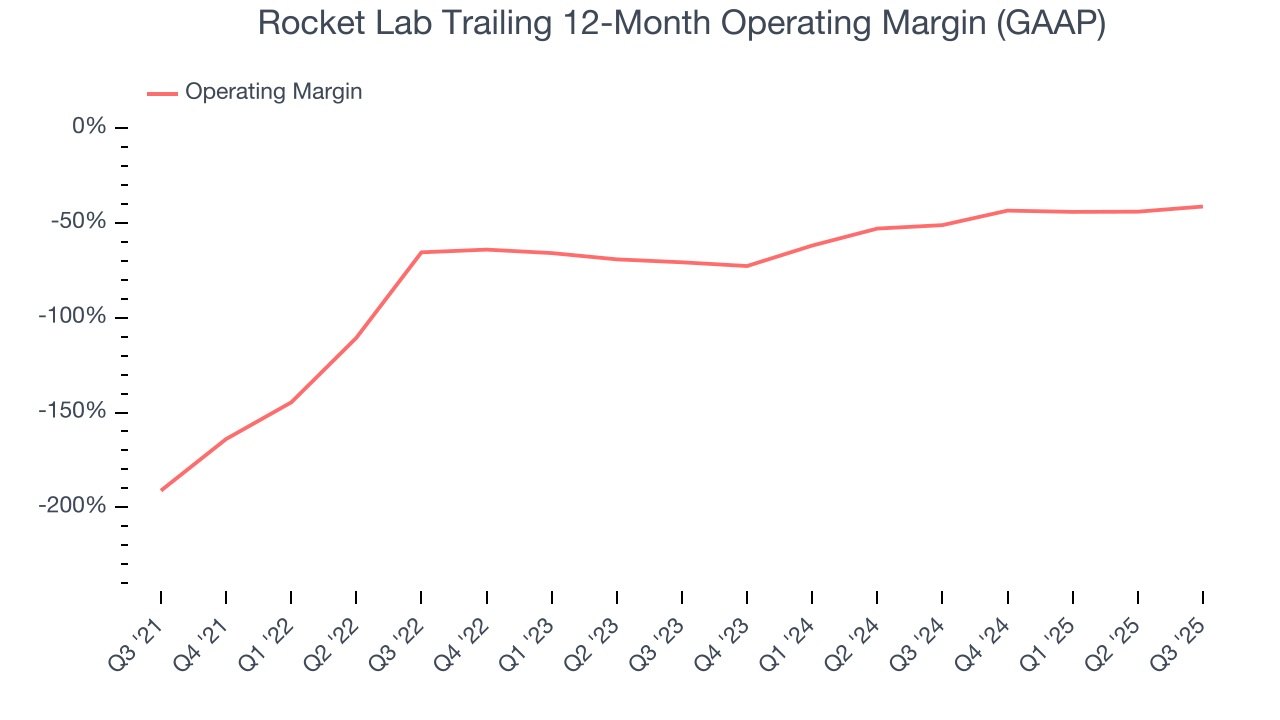
Rocket Lab’s operating margin was negative 38% this quarter.
7. Earnings Per Share
We track the long-term change in earnings per share (EPS) for the same reason as long-term revenue growth. Compared to revenue, however, EPS highlights whether a company’s growth is profitable.
Although Rocket Lab’s full-year earnings are still negative, it reduced its losses and improved its EPS by 30.8% annually over the last five years. The next few quarters will be critical for assessing its long-term profitability. We hope to see an inflection point soon.
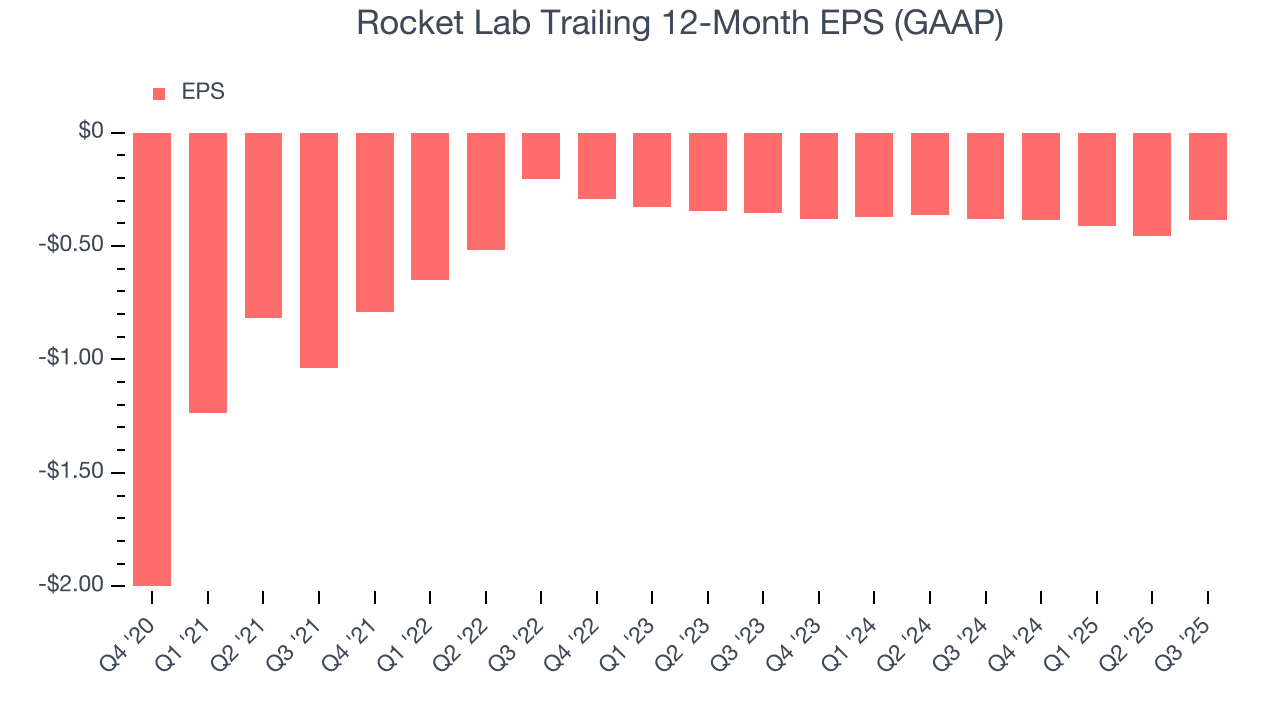
Like with revenue, we analyze EPS over a more recent period because it can provide insight into an emerging theme or development for the business.
For Rocket Lab, its two-year annual EPS declines of 4.1% mark a reversal from its (seemingly) healthy five-year trend. These shorter-term results weren’t ideal, but given it was successful in other measures of financial health, we’re hopeful Rocket Lab can return to earnings growth in the future.
In Q3, Rocket Lab reported EPS of negative $0.03, up from negative $0.10 in the same quarter last year. This print easily cleared analysts’ estimates, and shareholders should be content with the results. Over the next 12 months, Wall Street expects Rocket Lab to improve its earnings losses. Analysts forecast its full-year EPS of negative $0.38 will advance to negative $0.28.
8. Cash Is King
Free cash flow isn't a prominently featured metric in company financials and earnings releases, but we think it's telling because it accounts for all operating and capital expenses, making it tough to manipulate. Cash is king.
Rocket Lab’s demanding reinvestments have drained its resources over the last five years, putting it in a pinch and limiting its ability to return capital to investors. Its free cash flow margin averaged negative 52.9%, meaning it lit $52.89 of cash on fire for every $100 in revenue.
Taking a step back, an encouraging sign is that Rocket Lab’s margin expanded during that time. In light of its glaring cash burn, however, this improvement is a bucket of hot water in a cold ocean.
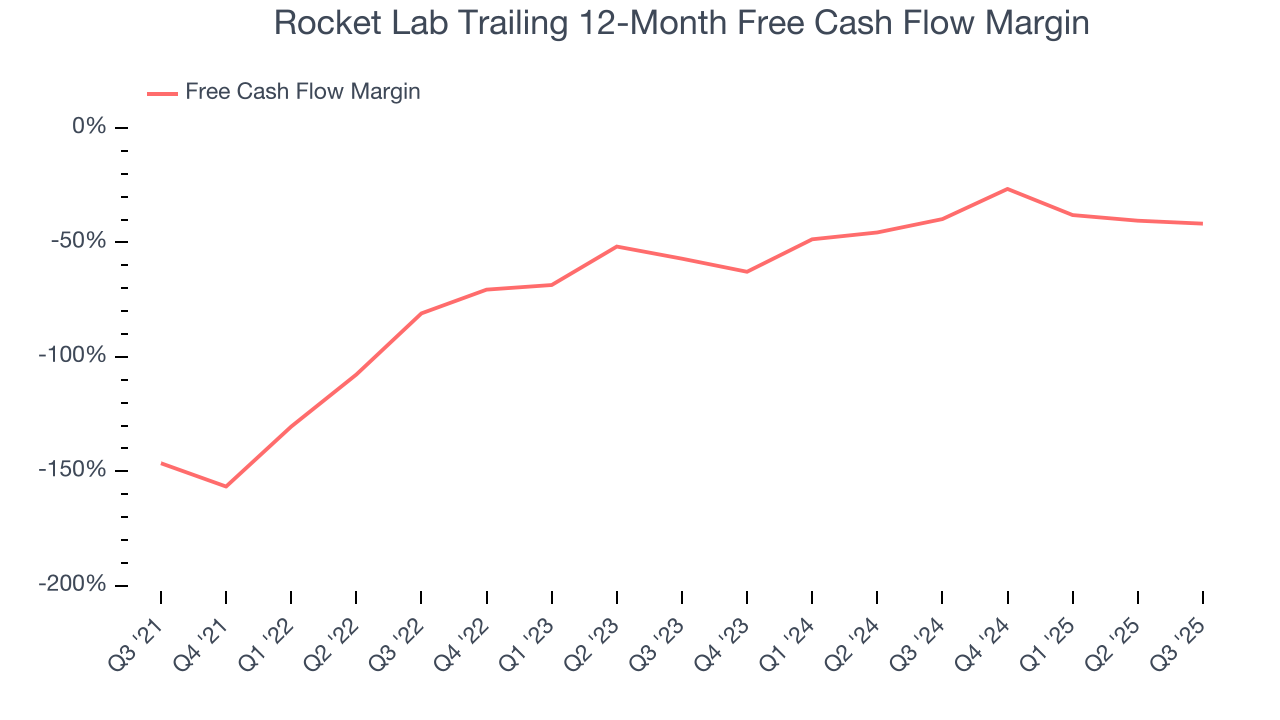
Rocket Lab burned through $69.44 million of cash in Q3, equivalent to a negative 44.8% margin. The company’s cash burn increased from $41.93 million of lost cash in the same quarter last year.
9. Return on Invested Capital (ROIC)
EPS and free cash flow tell us whether a company was profitable while growing its revenue. But was it capital-efficient? A company’s ROIC explains this by showing how much operating profit it makes compared to the money it has raised (debt and equity).
Although Rocket Lab has shown solid business quality lately, it struggled to grow profitably in the past. Its five-year average ROIC was negative 53.5%, meaning management lost money while trying to expand the business.
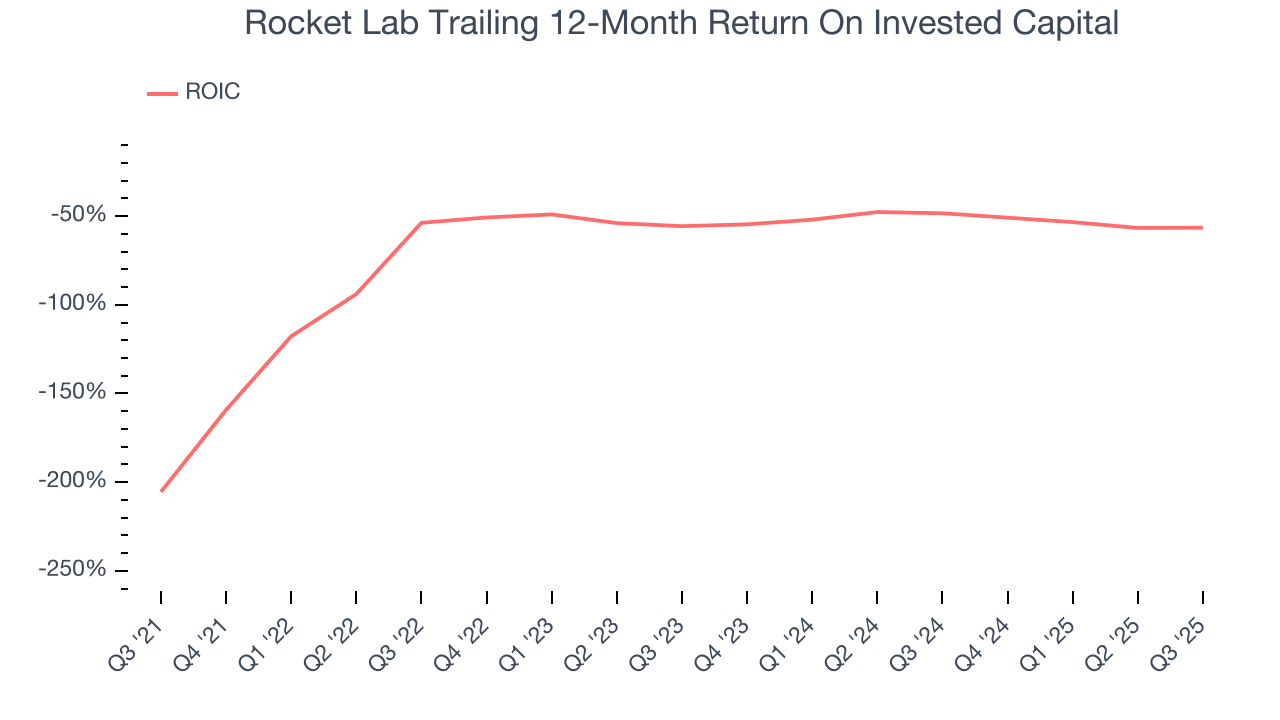
We like to invest in businesses with high returns, but the trend in a company’s ROIC is what often surprises the market and moves the stock price. Over the last few years, Rocket Lab’s ROIC averaged 2.3 percentage point increases each year. its rising ROIC is a good sign and could suggest its competitive advantage or profitable growth opportunities are expanding.
10. Balance Sheet Assessment
One of the best ways to mitigate bankruptcy risk is to hold more cash than debt.
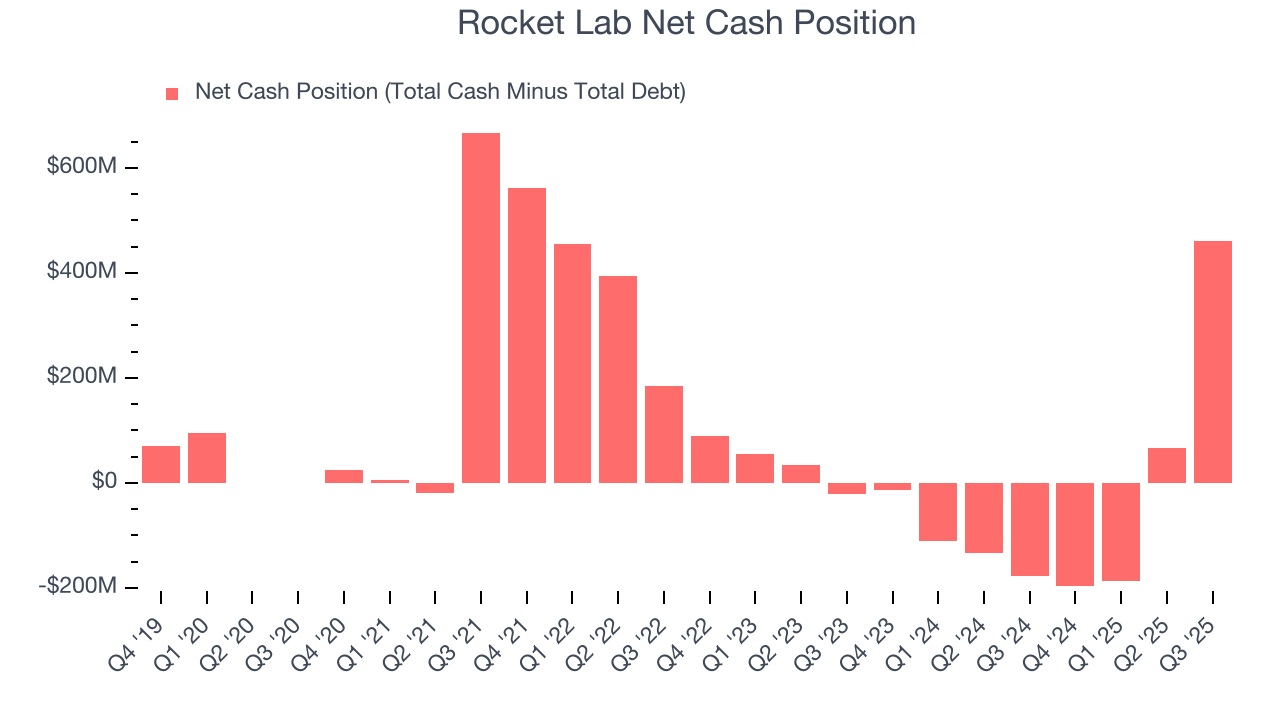
Rocket Lab is a well-capitalized company with $976.7 million of cash and $516.6 million of debt on its balance sheet. This $460.1 million net cash position gives it the freedom to borrow money, return capital to shareholders, or invest in growth initiatives. Leverage is not an issue here.
11. Key Takeaways from Rocket Lab’s Q3 Results
It was good to see Rocket Lab beat analysts’ EPS expectations this quarter. We were also glad its revenue outperformed Wall Street’s estimates. On the other hand, its EBITDA missed and its EBITDA guidance for next quarter fell short of Wall Street’s estimates. Overall, this print was mixed but still had some key positives. The stock traded up 7.3% to $55.72 immediately after reporting.
12. Is Now The Time To Buy Rocket Lab?
Updated: February 24, 2026 at 10:51 PM EST
The latest quarterly earnings matters, sure, but we actually think longer-term fundamentals and valuation matter more. Investors should consider all these pieces before deciding whether or not to invest in Rocket Lab.
When it comes to Rocket Lab’s business quality, there are some positives, but it ultimately falls short. To kick things off, its revenue growth was exceptional over the last five years. And while Rocket Lab’s relatively low ROIC suggests management has struggled to find compelling investment opportunities, its rising cash profitability gives it more optionality.
Rocket Lab’s forward price-to-sales ratio is 45.5x. The market typically values companies like Rocket Lab based on their anticipated profits for the next 12 months, but it expects the business to lose money. We also think the upside isn’t great compared to the potential downside here - there are more exciting stocks to buy.
Wall Street analysts have a consensus one-year price target of $83.96 on the company (compared to the current share price of $69.97).











